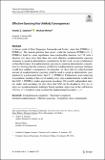Effective guessing has unlikely consequences
Abstract
A classic result of Paul, Pippenger, Szemeredi and Trotter states that DTIME(n) ⊊ NTIME(n). The natural question then arises: could the inclusion DTIME(t (n)) ⊆ NTIME(n) hold for some superlinear time-constructible function t(n)? If such a function t(n) does exist, then there also exist effective nondeterministic guessing strategies to speed up deterministic computations. In this work, we prove limitations on the effectiveness of nondeterministic guessing to speed up deterministic computations by showing that the existence of effective nondeterministic guessing strategies would have unlikely consequences. In particular, we show that if a subpolynomial amount of nondeterministic guessing could be used to speed up deterministic computation by a polynomial factor, then P ⊊ NTIME(n). Furthermore, even achieving a logarithmic speedup at the cost of making every step nondeterministic would show that SAT ∈ NTIME(n) under appropriate encodings. Of possibly independent interest, under such encodings we also show that SAT can be decided in O(n log n) steps on a nondeterministic multitape Turing machine, improving on the well-known O(n(log n)c) bound for some constant but undetermined exponent c ≥ 1.
Citation
Salamon , A Z & Wehar , M 2023 , ' Effective guessing has unlikely consequences ' , Theory of Computing Systems , vol. 67 , pp. 548-568 . https://doi.org/10.1007/s00224-023-10119-x
Publication
Theory of Computing Systems
Status
Peer reviewed
ISSN
1432-4350Type
Journal article
Description
Funding: EPSRC Grant number EP/P015638/1.Collections
Items in the St Andrews Research Repository are protected by copyright, with all rights reserved, unless otherwise indicated.

